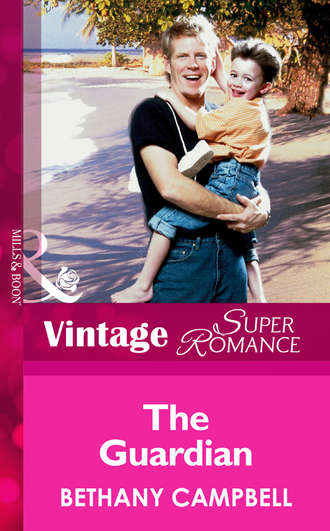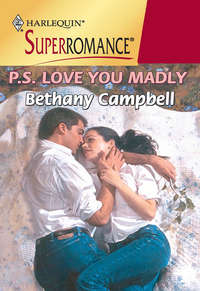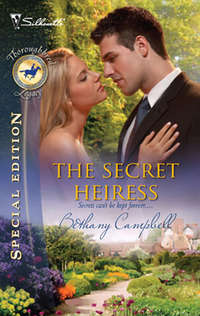
Полная версия
The Guardian
His khaki shirt looked weathered, and Kate could see a triangle of brown chest. Around his neck was a leather thong from which dangled some sort of small stone fetish.
He said, “If the phone doesn’t ring, it’s me.”
If the phone doesn’t ring, it’s me. It was the strange sentence Corbett had picked to serve as a password, and only he and she and this man knew it. The knots in her nerves untied themselves, and she almost smiled.
He didn’t. His face remained impassive. But he took off the hat. His brown hair was thick and streaked by the sun. The sideburns showed the faintest glint of silver.
“W.W. Hawkshaw. I’m a friend of Corbett’s.”
He offered her his hand, and she took it. A small, unwanted tingle of sexual awareness swarmed through her nerves.
Guiltily, she drew her hand away. Sex wasn’t to be trusted. It was what had gotten her and Charlie into this insanity in the first place.
Charlie clutched her more tightly and burrowed his face against her. He muttered something nearly incoherent about going home.
“Shhh,” she whispered. She no longer knew where home was.
Once again resentment warred with her fatigue. But before she could sort out her feelings, before she could even try, Hawkshaw had jammed on the hat again, pulling the brim back to its stem angle. He was ready to get moving.
“Allow me, ma’am,” he ordered, reaching for Charlie.
“I can handle—” she began, but he ignored her. Somehow, he had the boy out of her grasp and expertly cradled in his right arm. Charlie stirred, but didn’t waken.
Kate stared at the hard-looking man, but he only nodded toward her carry-on bag. “That, too, ma’am,” he demanded.
“It’s not that heavy.”
But he stripped it from her, slung it over his own free shoulder.
She stood, feeling half-naked without her burdens, and oddly nettled to be so efficiently relieved of them. He was a high-handed man, and she didn’t like it.
“You have other luggage?” he asked.
“Yes,” she admitted reluctantly. “The most important’s the dog—I hope they haven’t lost her.”
“Dog,” he repeated, completely without enthusiasm.
He made Kate feel awkward, and she resented it. “Corbett said it was all right to bring the dog. He said he asked you about it, and—”
“It’s fine,” Hawkshaw said, holding up his hand as if to silence her. “Don’t mention it.”
He started toward the baggage pickup area. “This way.”
Kate had no choice but to follow him. Why was he so damned preemptory? Because they were late? Maybe he’d been waiting for hours, and it had soured his mood. Well, it was good of him to have waited at all, and she supposed she should apologize, just to be polite.
“I’m sorry we’re late,” she offered, hurrying to keep up with him. “Our plane was delayed in Miami a long time—”
“Yes, ma’am. I’m aware of that,” Hawkshaw said.
“I know it was an inconvenience. Thank you for—”
“Don’t bother,” he said curtly.
“I just want to apologize for any—”
“Don’t bother,” he repeated and looked away pointedly, as if he found her irksome.
Oh, to hell with him, she thought tiredly. If he’s a boor, he’s a boor. I didn’t come down here for a friendly guy. I came for a tough one.
He stopped before the luggage carousel. He didn’t say, “How was your trip?” He didn’t say, “How’s my old friend Corbett?” He didn’t say anything.
She didn’t, either. Suddenly all she wanted was a bed and eight hours of sleep. She’d deal with Mr. Charm, here, in the morning, when she’d got her strength back.
She studied him furtively, taking his measure. His eyes had permanent creases at the outer edges. They gave him the look of a man who had spent his life watching the world around him and watching it carefully.
He didn’t look at her. She had the impression he was purposefully ignoring her. But then, almost against his will, it seemed, he gazed down at Charlie. His craggy face didn’t mellow.
“So this is Charlie?” he said.
Kate looked at her son, so young, so innocent of what was happening to him, lying so trustingly against this stranger’s chest. A rush of tenderness swept away her other emotions, and she felt a lump like a fist in her throat.
“Yeah,” she said. “That’s Charlie.”
HAWKSHAW HAD WAITED for the plane with deep misgivings. He was a private man about to surrender his privacy, and he had already damned himself for it a thousand times.
And his mood was frankly rotten. Right before he’d left for Key West airport, his ex-wife had called from Hawaii. She had an engagement singing in the lounge of a very upscale hotel on Waikiki Beach. “I’m in love,” she’d announced. “I’m finally over you. I think I’m going to get married.”
Suddenly Hawkshaw had remembered everything he’d worked to forget: the loss, the guilt, the failure, the incredible emptiness.
He’d forced cheer into his voice and congratulated her with all the heartiness he could muster. He didn’t ask her the details. He didn’t want to hear them.
She deserved to be happy, God knew. But basically what Hawkshaw had wanted to do was get drunk and stay that way for about a week. Maybe put his fist through a wall or two, that sort of thing.
But instead of mourning for the woman he wanted, he was stuck baby-sitting for one he didn’t want in the least. The Kanaday woman was prettier than he’d expected, and for some obscure reason, this annoyed him.
Certainly Corbett’s fuzzy photos had given no hint of her attractiveness. She’d looked thin and uninteresting in the pictures.
In the flesh, she was slender, not skinny, and her features, although not perfect, were good enough, and the red-gold of her hair was stunning.
Hell, he’d thought, no wonder somebody’s after her. And then he’d thought, Dammit, Corbett. What have you done to me now?
CHAPTER TWO
HAWKSHAW RECOVERED HIMSELF, more or less.
This woman was one last assignment—and there was a rigid rule about assignments: Do Not Get Emotionally Involved. In his present mood, it seemed a laughably easy rule to keep.
He loaded the woman’s luggage in the back of his van and swung the heavy dog cage inside. The dog snuffled and whined.
It was a basset hound, for God’s sake. One of those low-slung, bowlegged lugubrious-looking dogs with ears that nearly dragged the ground.
Except for the dog, the woman and kid were traveling remarkably light. That was good. That was probably Corbett’s doing. (Couldn’t Corbett have talked her into leaving the fool dog behind?)
The kid was strapped into the back seat. He’d wakened briefly when his mother put him in the van, but now he was dead to the world again.
Hawkshaw got into the driver’s seat. The woman sat in the passenger seat, staring up at the ink-dark sky. The lights of the airport parking lot fell through the windshield, illuminating her profile. It was a nice profile, he noted, but she wasn’t Helen of Troy.
He started the van. From the back, the dog gave a pathetic yodel of canine heartbreak.
Hawkshaw headed out on South Roosevelt Street, toward the highway. The street ran beside the shore of the Atlantic side of the island, and the sea was rough tonight.
“We’ve never been in Florida before,” said Kate Kanaday, staring out at the ocean. Its darkness was dimly streaked with lines of white foam breaking.
She had a low voice, the kind that would sound sexy over a telephone. He hadn’t noticed her voice before. Funny. Maybe it was the darkness that made him notice now. He thought of a man listening in the dark to that voice, becoming excited by it.
She said, “Where are we going? Will you tell me that much? Corbett wouldn’t say. Only that we’d meet you here, in Key West.”
He narrowed his eyes against the glare of oncoming headlights. Traffic was heavy, even at this time of night. Key West was a party town, and the party never stopped.
He said, “It’s in the lower keys. A place called Cobia Key. Not many people know where it’s at.”
Which is to your advantage, he thought. Which is to your very great advantage.
“I do,” she said without hesitation. “It’s the island sixteen miles north of Key West. There’s a heron preserve there.”
He allowed himself to lift an eyebrow in surprise, but kept his gaze fastened on the road. “You’ve heard of it?”
“I read about it,” she said in her low voice. “When we were delayed so long in Miami, I bought a book.”
Of course, he thought. She’d read about it. She would. “Yeah,” he said. “You worked in a bookstore.”
“Yes,” she said. “I used to.”
There was no self-pity in her voice, only resignation.
Hawkshaw stole a sideways look at her. The van’s windows were down, and although her hair was pinned back in some sort of braid, strands had escaped and fluttered around her face.
The van was on the highway now, crossing one of the dozens of bridges that linked the islands that formed the Keys.
The Kanaday woman said, “You live on Cobia Key?”
“For now,” he said. “It’s nothing fancy. It’s in the backcountry. Off to itself.”
“I don’t mind,” she said, still gazing moodily at the Atlantic. “As long as it’s safe.”
In the back of the van, the basset hound gave a throaty complaint followed by a series of mournful snorts.
She said, “You were in the Secret Service with Corbett?”
“Yeah,” he said.
“Until he retired, went into business on his own?”
“Yes.”
“And you’ve retired, too?”
“Yes.”
Two years ago he’d taken an early retirement, at age forty-two, exactly twenty years after signing up with the Treasury Department. He’d loved the job, but he’d left it in self-disgust after he’d lost Sandra.
He didn’t want to talk about himself or the Service or his relationship to Corbett or to think about Sandra. So he said, “Tell me about this problem you’ve got. Do you think Corbett’s got some lead on the stalker? Something he’s not ready to tell you or me?”
She stiffened as if the word stalker sent a bolt of electricity ripping through her system. She drew her breath between her teeth. “No,” she said. “I don’t think he does. He’s afraid my only option is to go away.” She turned to him. “I have a friend, Carol, in Denver who’ll help. I worked it out with her over a pay phone, so nobody could tap into the conversations. But Corbett still didn’t want us to go straight there. He’s very cautious. I hate imposing on you.”
“Don’t mention it,” muttered Hawkshaw.
“I mean it,” she said. “I hate it. My money situation’s complicated right now, but somehow I’ll reimburse you. I pay my own way. We’re not a charity case, Charlie and I.” She turned away again. “So tell me about yourself,” she said. “What do you do, now that you’re retired?”
“As little as possible.”
“Do you have a first name?” she asked.
“None that I answer to.”
“How long did you and Corbett work together?”
“Fourteen years, off and on.”
“All of it in Washington?”
“A lot of it,” he said.
“Like where else?”
“Here.” he said. “There.”
She shifted in her seat and he could feel her looking at him. “Would you rather we not talk? Is that it? All you have to do is say so.”
The words surprised him. There was a certain sassiness in them he hadn’t expected. But, what, God help him, if she was a talker, one of those women who never shut up?
“I’m out of practice,” he said dryly.
“If you’re worried that we’re going to intrude on your life, don’t be,” she said. “We’ll keep to ourselves as much as possible.”
“Umph,” he said.
“The last thing I want to do is be a bother.”
“Um.”
“I mean, I, of all people, know what it’s like to have your privacy invaded.”
Touché, he thought. A good point, that.
“I have plenty to do,” she said, as if to herself. “I’ve got a lot of decisions to make, things to plan. I mean, if I look at the bright side, I’ve got a whole new life ahead, a completely fresh start.”
He almost said something sarcastic. Already she was trying to look on the bright side? To be optimistic? Lady, don’t you understand what’s happening to your life?
He stole another glance at her. She had one elbow on the window’s edge, her knuckles pressed hard against her jaw.
The moon, nearly full, had broken through the clouds, silvering her profile. She looked like a face delicately carved on a coin.
With a start, he realized she was biting her lip. He thought he saw the glitter of tears in her eyes, but she blinked hard twice, then three times. The glitter disappeared.
He said nothing.
In the back, the dog whined as if its heart were irreparably broken. But Katherine Kanaday kept her back straight, her eyes looking straight ahead, and her chin up.
HAWKSHAW’S PLACE WAS in “the backcountry,” he’d said, but his words had given Kate no hint of how desolate the backcountry could seem.
The van left the main highway, meandered through a small development of homes that stood dark and lifeless as tombstones. Then the houses grew fewer and farther apart, and when, at last they came to an end, civilization seemed to end with them.
The dark land stretched out blackly on either side, thatched with scrub wood. The air was heavy with a rich, swampy scent. The winding road narrowed and seemed to roll on forever, but at last Hawkshaw turned in at a graveled drive. He got out of the van and opened a padlocked gate.
Kate could make out a tall chain-link fence glinting faintly against the trees. After Hawkshaw moved the van through the gate and refastened the lock, he drove on into a darkness so thick it gave her a twinge of claustrophobia.
A small deer leaped across the road and was caught briefly in the van’s headlights. It was such a tiny, elfin creature, Kate thought she was hallucinating.
She gasped in surprise.
“Key deer,” Hawkshaw said, sounding bored. “That’s all.”
She blinked and the animal was gone, as if it had vanished back into the magical world where it belonged. Of course, she thought, it had been one of the miniature deer peculiar to these islands. “Oh,” she said softly. “I read about them.”
He gave no response. He pulled up next to a house that even in the darkness seemed neglected, almost deserted. She heard the lapping of water when she got out of the car and thought she could smell the ocean nearby, but she could not see it.
Hawkshaw carried Charlie up a narrow flight of stairs to what seemed to be a long deck. He unlocked the front door, switched on the inside lights, and took the boy inside. Kate followed, blinking at the disarray.
Hawkshaw was lean of body and spare of speech, and she had expected the house to be lean and spare, as well. But the living room was crammed with run-down furniture and cluttered with fishing and boating paraphernalia. Some sort of huge stuffed fish hung on the wall; it gave her an unwelcoming stare.
“It’s kind of a mess,” Hawkshaw said, in a masterpiece of understatement.
Kate smiled weakly. The decor, she decided, could be described only as Late Bachelor Hellhole.
“Your room’s this way,” he said, moving down a narrow hallway. “Watch out for the oar.”
He hit another light switch with his elbow, and stepping over an abandoned oar, he carried Charlie down the hall to a back room. He turned on yet another light.
Kate followed warily. The bedroom gave off the air of being unused for years, perhaps decades. Boxes were piled haphazardly against the walls, as if Hawkshaw had been moving out, then suddenly changed his mind.
There was little furniture: an old wicker dresser, a metal desk and folding chair, a pair of twin beds with mismatched spreads.
The Ritz it isn’t, thought Kate, with sinking heart.
But Hawkshaw turned down the cover and sheet of one bed with the air of a man who knew what he was doing. She was surprised to see that the sheets and pillowcase seemed crisp and clean, freshly laundered.
He laid Charlie down and started to untie one of the child’s scuffed running shoes, then abruptly straightened. His eyes met hers. “You’ll want to do that,” he said gruffly.
The room was small, its ceiling low, and suddenly Hawkshaw seemed even taller and wider-shouldered than he had at the airport. He hooked his thumbs on either side of his belt buckle and cocked one hip. He looked her up and down, his eyes narrowed. The slant of his mouth was resigned.
“There’s a bathroom in there,” he said, nodding toward a badly chipped door. “I’ll get the rest of your things. And your dog.”
Kate winced. The dog, still caged in the van, had started to bay piteously.
Hawkshaw shook his head, then pulled the brim of his hat down even more. He made his way past her, but the room was so small that he accidentally brushed his arm against hers as he headed toward the door.
The fleeting touch of his body was unexpectedly electric. Once again his gaze locked with hers, and the complexity she saw in those green depths shook her.
Quickly he glanced away, and then he was gone, striding down the little hall. She felt a strange, inner shudder. She’d read a profound resentment burning in his eyes, and she was sure it was resentment of her.
He did not want her and Charlie here. She had almost been scalded by the rancor she had felt flaring in him. Yet she sensed more than rancor in that swift, telling look. There had been something like desire, all the sharper for not being welcomed.
She knew because she had felt the same sensation; a sudden hot spark of sexual attraction that she disliked, and wanted to disclaim.
The slightly musty air of the room seemed to throb with his presence, even though he was gone. Don’t be asinine, she scolded herself. She was so tired that she was drugged by fatigue; it was making her imagine foolish things.
She sighed and bent over Charlie and finished untying his shoes. She slipped them off, loosened the button at the throat of his polo shirt. Then she shook him gently.
“Charlie,” she whispered. “Everything’s fine. We’re in Florida. Get up and go to the bathroom. Then you can go back to sleep.”
Charlie stirred grumpily. His long lashes fluttered open, and he squinted, frowning at her. He tried to roll over and ignore her.
But she persisted. She wanted him to know he was in a new place, but that he was safe and that she was there with him. Finally she roused him enough to lead him into the bathroom.
“We’re in Florida,” she told him, “with a man named Mr. Hawkshaw.”
“I don’t care,” Charlie grumbled.
“I want you to understand. We’re in Florida. With Mr. Hawkshaw. What did I just say?”
“Florida,” Charlie muttered. “Mr. Shocklaw.”
“Hawkshaw,” she repeated, taking him back to the bedroom. “There’s your bed. The bathroom’s right over there. I’ll leave the light on in case you have to get up.”
The boy climbed back into bed and struggled, frowning, to get between the sheets.
“Do you want your pajamas?”
“No,” he yawned. “Let me sleep.”
He fell back against the pillow, his eyes already closed.
Hawkshaw came in the door, carrying their few pieces of luggage. He set them down near the doorway. The fat basset hound, Maybelline, waddled behind him, her eyes wells of sorrow over what she had suffered.
Maybelline gave sadly accusing looks to both Kate and Hawkshaw. Then huffing and straining, she managed to clamber onto Charlie’s bed. She shot the two adults another aggrieved glance, then turned around several times and, with a grunt, plopped down beside Charlie.
“I hope you don’t mind,” Kate said. “The dog always sleeps with him. He’ll feel more at home if she—”
“No problem,” Hawkshaw said, cutting her off. He turned and left, closing the door behind him as if he was glad to have a barrier between them.
Kate sighed and sat on her own bed. She stared at the shut door and suddenly felt as if she were in prison.
If Hawkshaw found it so damned disagreeable to have them here, why on earth had he said they could come? He might be a fine bodyguard, a protector par excellence, but did he have to be so silent and surly and turbulent?
On top of it all, he had some weird sexiness, and he knew it. As if she, of all people, was going to go for the dangerous, mysterious type. No, thank you. If she ever got mixed up with another man, she hoped it was a mildmannered teddy bear of a fellow who gave off an aura of danger no greater than a marshmallow.
Oh, hell, she thought wearily. Why was she criticizing Hawkshaw? He might be edgy and rude, but he’d been good enough to take them in, hadn’t he? Perhaps she should no more blame him for his prickly coldness than she should blame an attack dog for being vicious.
She sighed, rose, and got ready for bed. She wouldn’t let this man get her spirits down. She simply would not allow it.
She left the bathroom light on and the door partly open, in case Charlie awoke. She turned out the overhead light and settled into the bed, which was surprisingly cool and soft.
From beneath the closed bedroom door came a wedge of yellow light, and there was the sound of music somewhere, muted and rather haunting. Hawkshaw must still be up.
She was stricken with a sudden, piercing memory of his sea-green eyes. No, my girl, none of that, she told herself firmly. She would not think that way.
The stalker had stolen a few small items from her—possessions that she had left near the doorstep or on her patio—nothing that seemed of great consequence.
But, in truth, he had stolen far larger things: her job, her home, her peace of mind. He had stripped trust from her life, especially trust of men. And along with it, he had thieved away desire.
HAWKSHAW SAT AT HIS father’s battered desk in the living room, going over the Kanaday woman’s file again. Now that he had met her and the kid, the case no longer seemed an abstraction, nor did they. They were flesh and blood.
Yes, he thought, and the reality of her was distracting, because all he wanted to think of was Sandra, who was marrying someone else and would never be his again.
Sandra, he thought hopelessly. The memory of her was always like a knife in the heart. He forced himself not to think of her sensual blondness. He made himself look instead at the fuzzy reproductions of the snapshots that Corbett had sent of Kate Kanaday. There were only three.
The first showed her and the kid sitting before a towering Christmas tree. The picture was dated two years ago. The kid, Charlie, was on Kate’s lap, mugging for the camera, and she was smiling with what seemed like real joy.
The camera didn’t love her, he told himself. Not the way it had loved and flattered Sandra.
But the smile—Kate Kanaday’s smile was nice, and it was full of the love of life. He wondered if she would ever smile that way again. He set the photos aside, face down.
He scanned the file again, looked at one of the notes from the stalker. The man had written:
I WANT TO TOUCH YOU EVERYWHERE. TO KISS YOU EVERYWHERE. TO EXPLORE EVERY INCH OF YOUR BODY. YOU WILL OPEN YOURSELF TO ME, AND CRY OUT WITH UNBEARABLE PLEASURE AT THE JOY MY BURNING THRUSTS WILL BRING YOU...
Hawkshaw shook his head in disgust. He knew what the police had probably told her, that guys who wrote such muck seldom acted on it. They got their jollies through the words and didn’t have to do the deeds.
But Hawkshaw knew this was not always true. He closed the file, pushed away from the old desk. He got to his feet and took another beer from the fridge. He went outside, to the deck.
The boards creaked beneath his feet. The deck was sagging and in disrepair like the rest of the property. He would have to make up his mind sooner or later: either fix up the house or tear it down for good.
He sipped the beer and stared off into the velvety darkness. This point of land was surrounded by tidal streams and mangrove islands. He heard the splash of a fish, perhaps even a dolphin, for dolphins sometimes came into the waters.









